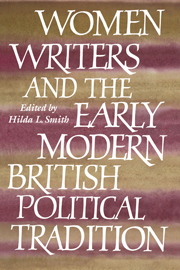Book contents
- Frontmatter
- Contents
- List of contributors
- Preface
- Introduction: Women, intellect, and politics: their intersection in seventeenth-century England
- Part I Women's political writings, 1400–1690
- Part II Women's political and philosophical writings, 1690–1800
- Introduction to Part II
- 5 Astell, Masham, and Locke: religion and politics
- 6 The politics of sense and sensibility: Mary Wollstonecraft and Catharine Macaulay Graham on Edmund Burke's Reflections on the Revolution in France
- 7 Mary Wollstonecraft on sensibility, women's rights, and patriarchal power
- 8 Emilie du Châtelet: genius, gender, and intellectual authority
- Part III The intellectual context and economic setting for early modern women
- Part IV Early modern legal and political prescriptions for women
- Conclusion: women's writing, women's standing: theory and politics in the early modern period
- Index
Introduction to Part II
from Part II - Women's political and philosophical writings, 1690–1800
Published online by Cambridge University Press: 04 August 2010
- Frontmatter
- Contents
- List of contributors
- Preface
- Introduction: Women, intellect, and politics: their intersection in seventeenth-century England
- Part I Women's political writings, 1400–1690
- Part II Women's political and philosophical writings, 1690–1800
- Introduction to Part II
- 5 Astell, Masham, and Locke: religion and politics
- 6 The politics of sense and sensibility: Mary Wollstonecraft and Catharine Macaulay Graham on Edmund Burke's Reflections on the Revolution in France
- 7 Mary Wollstonecraft on sensibility, women's rights, and patriarchal power
- 8 Emilie du Châtelet: genius, gender, and intellectual authority
- Part III The intellectual context and economic setting for early modern women
- Part IV Early modern legal and political prescriptions for women
- Conclusion: women's writing, women's standing: theory and politics in the early modern period
- Index
Summary
Little attention has been given to women in the intellectual landscape of late seventeenth-century and eighteenth-century Britain and France. And the existing scholarship has focused overwhelmingly on feminist writings and on writings and efforts associated with the French Revolution, in Britain as well as France. This second part of Women Writers and the Early Modern British Political Tradition expands the reach to women writers and intellectuals beyond the radical and feminist debates of the late eighteenth century. Mary Astell and Lady Damaris Mascham are integrated into the philosophical discourse among Cambridge Platonists and Lockean epistemologists of the late seventeenth century, as active participants in the debate. The thought of Mary Wollstonecraft is placed in a broader and comparative context, linking her writings especially to those of her somewhat earlier contemporary, the historian Catharine Macaulay; and her response to Edmund Burke's Reflections on the Revolution in France is tied not alone to her views of women's place within the revolutionary debate, but to her radical theories of the nature of the state generally. Wollstonecraft's political views are also treated by integrating them into her portrayal of the family in eighteenth-century society. And finally, Emilie du Châtelet, the eighteenth-century French mathematician who produced the definitive translation of Newton's Principia so crucial for the evolution of Enlightenment thought, is studied to examine how genius remained a gendered concept among Enlightenment thinkers.
- Type
- Chapter
- Information
- Publisher: Cambridge University PressPrint publication year: 1998

